This 2023 thriller has been criminally overlooked. Here’s why you need to watch it in 2024
- Oops!Something went wrong.Please try again later.
- Oops!Something went wrong.Please try again later.
- Oops!Something went wrong.Please try again later.
This article contains affiliate links; if you click such a link and make a purchase, Digital Trends and Yahoo Inc. may earn a commission.
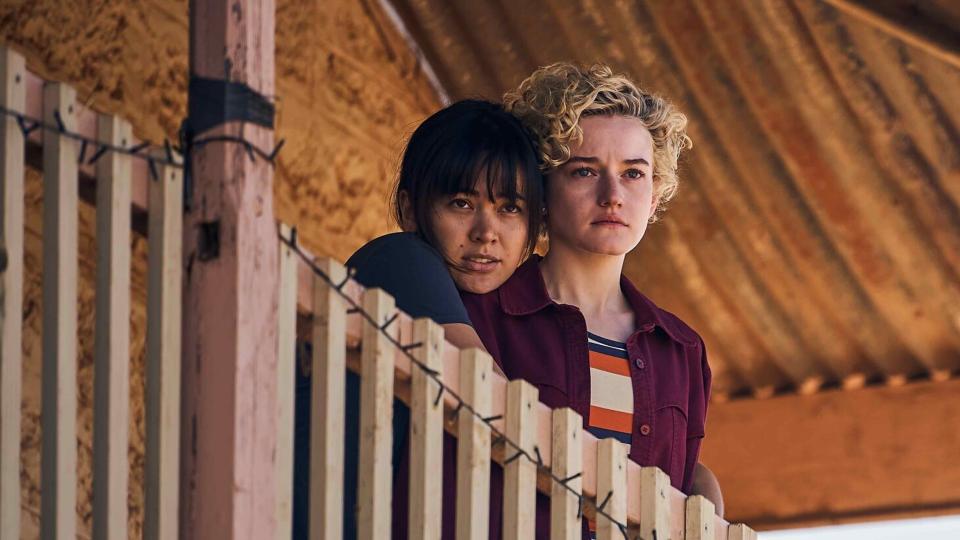
From off-screen, a scream. Or is it a laugh? Relaxing on a patch of outback dirt that they really hoped was going to be a watering hole, American vacationers Hanna (Ozark‘s Julia Garner) and Liv (Glass Onion‘s Jessica Henwick) can’t tell which it is. From a distance, revelry can sound like distress, and vice versa. “She’s laughing,” Liv concludes of the stranger they don’t see and can only barely hear, even with ear to the wind. But she doesn’t sound so sure.
This offhand moment perfectly encapsulates the creeping dilemma of The Royal Hotel, a movie about parsing uncertain situations for signs of trouble and distinguishing harmless fun from danger. The scene also links Kitty Green’s slowly burning fuse of a drama to a crop of 2023 releases that made screams from off-screen a disturbingly timely motif: see (or rather hear) the high pitch of Robert Oppenheimer’s conscience or the crisp, faraway shriek emanating from beyond the walls of a Nazi dream house.
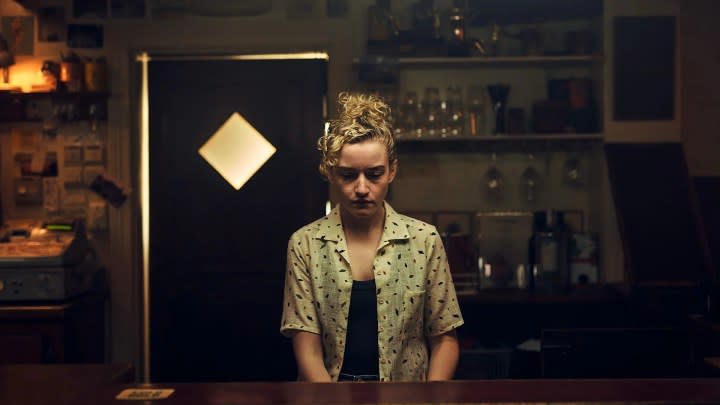
The Royal Hotel hasn’t earned a fraction of the attention bestowed upon Oppenheimer, The Zone of Interest, or any of the newly minted Oscar nominees. You could say, in fact, that the film is something of a scream from off-screen itself — a howl of anxiety that fell on deaf ears last fall, drowned out by the noise of awards season. Of course, plenty of worthy movies get lost as the year-end conversation narrows. But this movie really deserves to find the audience that eluded it in the wake of a quiet festival debut and quieter theatrical release. It’s a nightmare every bit as rich with insight as it is suffocatingly suspenseful.
While some of the year’s most acclaimed films strategically averted their gaze from bad things happening, relegating horrors to the space outside the frame, Green explored a milieu where “bad things happening” is always an implicit possibility. The title is the setting, which couldn’t be more ironically named. There’s nothing so royal, after all, about the seedy bar Hanna and Liv — broke, far from home, desperate for some cash to keep their vacation afloat — end up tending. Situated in a remote Australian mining community many hours from what the two would consider civilization, it’s the kind of place where everybody knows your name, even if you’d prefer they didn’t.
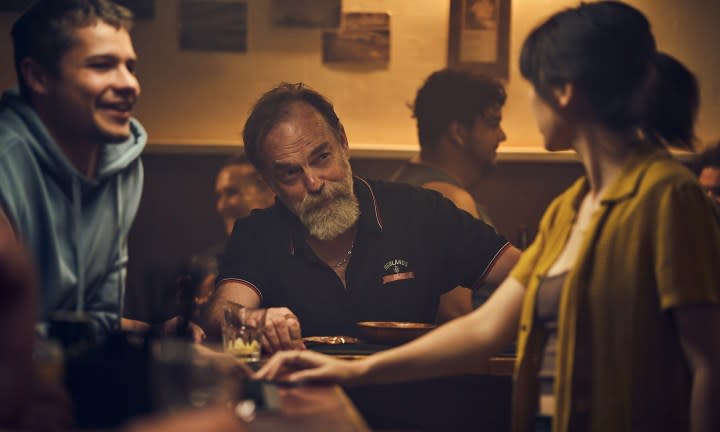
“You’re going to have to be os with a little male attention,” the twentysomething women are warned, and that’s putting it mildly. The clientele of the Royal is as rowdy and leering as a cell block. But the regulars aren’t indistinguishable. With a curiosity that betrays her roots as a documentarian, Green lays out a whole social order of drunken, fragile, variably toxic masculinity. The lurking creep (Daniel Henshall) is plainly not to be trusted. But what about the less obviously menacing patrons, like the boyish Matty (Toby Wallace) or the lovelorn brute Teeth (James Frecheville)? The Royal Hotel is like a version of Alex Garland’s Men that doesn’t clonk you over the head with its messaging, even as it works its way to a not-so-radically-different conclusion.
Green’s last movie, The Assistant, was another sharply observed portrait of a hostile workplace: the New York City fiefdom of an unseen movie producer who was Harvey Weinstein in all but name. There, Garner played a young woman in an office environment institutionally structured to serve the unchecked appetites of a single powerful abuser. The Royal Hotel, which lightly fictionalizes the events depicted in the 2016 documentary Hotel Coolgardie, scrambles the dynamic, dropping Garner into a less glamorous space where just about everyone is some shade of sketchy or unsafe. Differences aside, the movies are plain companion pieces; taken together, they paint a picture of how predatory behavior is woven into the very structures of work and social culture, regardless if you’re serving bottled water in Manhattan or cold drinks Down Under.
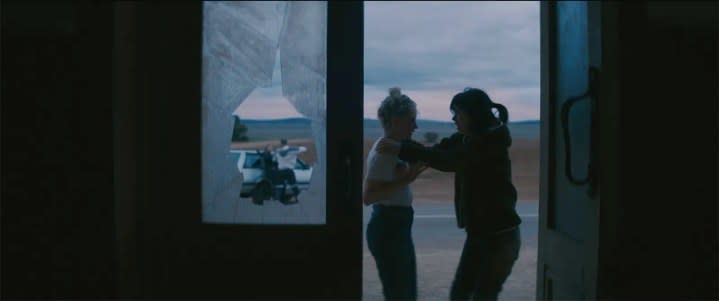
What’s remarkable about Green’s work is how willing she is to complicate a situation and toy with our sympathies. Her films are too damn thorny to ever become simple screeds. In The Royal Hotel, she keeps undercutting Hanna’s blossoming unease — and maybe the audience’s — with the possibility that bias is coloring her distrust of the locals. Is she being condescending in assuming all these working-class dudes have ill intentions? Early in the movie, her privilege shows, loudly, when she expresses surprise that her townie admirer, Matty, studied meteorology in school. And is some of what she reads as vulgar hostility just a culture-clash misunderstanding? When their new boss, played by an unrecognizable Hugo Weaving, greets them with a four-letter word considered much more derogatory in the States, Liv lets him off the hook with the benefit of the doubt: “It’s, like, a cultural thing.”
Most provocatively, The Royal Hotel dares to create friction between its heroines as young women who set different boundaries. Liv, the more laidback of the two, could be behaving recklessly by drinking heavily with the strangers she serves … or she could just be more willing to let go of her inhibitions on vacation. Green expertly walks a tricky line by acknowledging the potential danger Liv puts herself in throughout the movie without indulging in victim-blaming. And there’s a fearless edge to the conflict that develops between the two characters as Hanna is forced to navigate an almost apocalyptically dicey situation alone — fending off increasingly threatening advances while being regarded as an uptight party pooper even by the friend she’s tirelessly trying to protect.
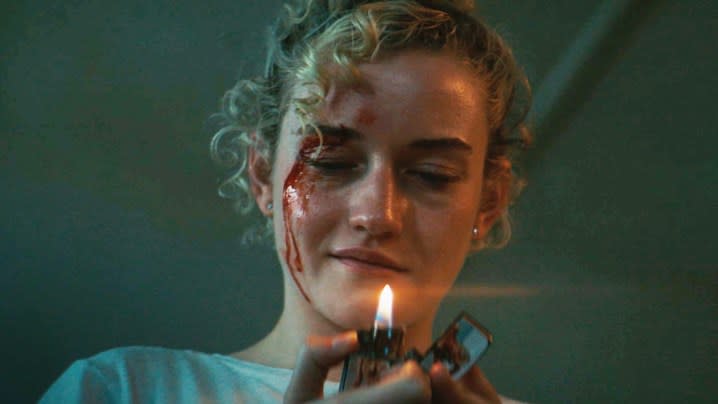
One might wonder if The Royal Hotel would have made a bigger splash if it didn’t hover in such a tense liminal space between genres. Sheltered Americans pretending to be Canadians (because who doesn’t love Canadians?) in the Australian boonies is a logline that could have been played for Crocodile Dundee comedy or Wolf Creek horror, but Green dances around both expectations. And while the film’s mounting intensity and drunken lunacy has inspired comparisons to Ozploitation classics like Wake in Fright, the payoff might not be as overtly, harrowingly violent as genre fans would want or expect.
THE ROYAL HOTEL - Official Trailer
But that’s crucial to what the movie is after. It exists in a kind of purgatorial state of potential calamity — on the edge of the violence (sexual or otherwise) that Hanna avoids only through nonstop vigilance. Tilting into that violence would, in some respect, operate as a release. Green would rather keep us floating in the dread of awful possibility. She’s made a thriller about what it means to be a woman in a world of men, keeping one eye open at all times. The film’s power comes through loud and clear, a scream that’s decidedly on=screen.
The Royal Hotel is available to rent or purchase from major digital services like Amazon Prime Video. For more of A.A. Dowd’s writing, visit his Authory page.

